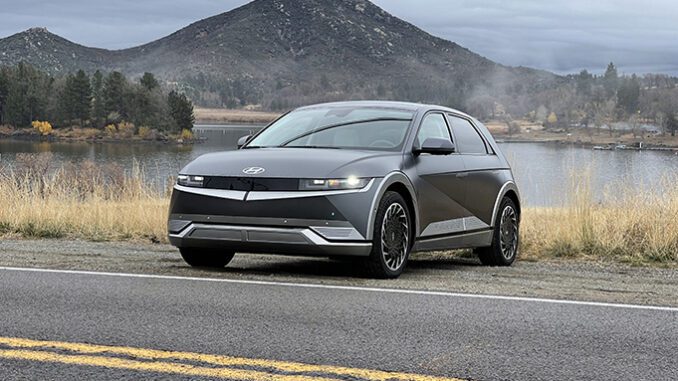
2021 is the year that electric cars went mainstream. The Ford Mustang Mach-E (Mach-E review; Mach-E GT review) and Volkswagen ID.4 (review) are solid, attainable electric cars. They have personality and are exciting and, most importantly, they’re normal.
Rather than early adopters and eco-warriors, regular people are beginning to buy EVs in significant numbers, and the conversion from internal combustion to electic is in full swing.
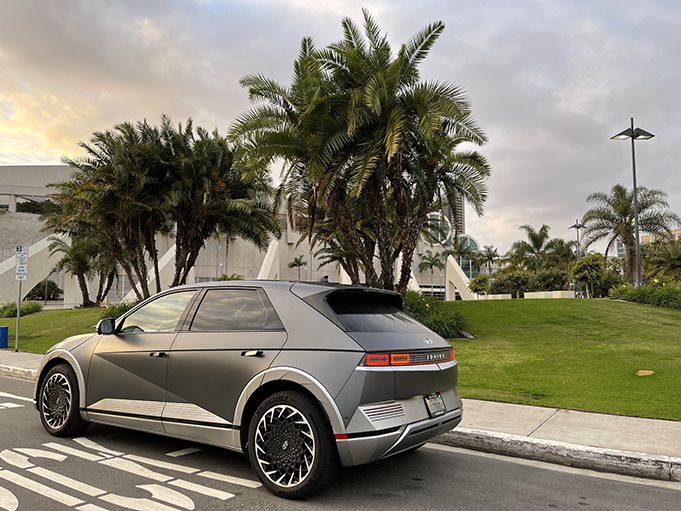
2022 might be The Year of the EV too, but 2021 isn’t entirely done with us yet. Last week, I got to test the new Hyundai Ioniq 5, and it’s my favorite of the new crop of electric cars.
It’s the first to run on Hyundai’s purpose-built E-GMP platform. That platform is designed to maximize interior space and allows for designs that aren’t possible with a traditional internal combustion engine.
The Ioniq 5 has the longest wheelbase of any Hyundai, including the gigantic three-row Palisade (review). The wheels are pushed way out to the corners of the car, and the transformation of the inside that results is astonishing. Hyundai swears that the Ioniq 5, the first of a growing family of Hyundai Ioniq vehicles (the prior Ioniq electric car has been discontinued, though the hybrid version continues, confusingly), is a compact SUV, but it’s more of a large hatchback.
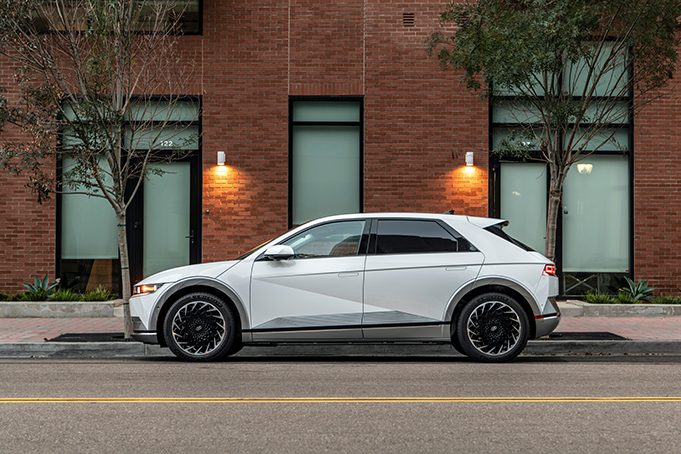
But thanks to the clever packaging and proportions of the E-GMP platform, the Ioniq 5 feels far more spacious when you slip inside. A sizeable floating dash contains two large screens, one for the instrument cluster and the second for infotainment. Below those are manually operated vents which somehow is a feature now because Tesla and Rivian (review), among others, have switched to ducts that are aimed digitally.
Below the screens are an actual volume knob and a selection of dedicated climate and radio buttons. There is, however, no physical button for the seat heaters. Instead, you need to dive into the menus, taking several steps if you’re using Apple CarPlay or Android Auto. Hopefully, this will get fixed in an update since the Ioniq 5 is capable of over-the-air updates, and Hyundai plans to introduce new features over time.
But under that, it’s wide open, with spacious footwells and tons of room. Between the front seats is a sliding console that can move backward to give more space on the floor for a bag or purse, or it can slide forward to provide more rear legroom (and make the armrest functional).
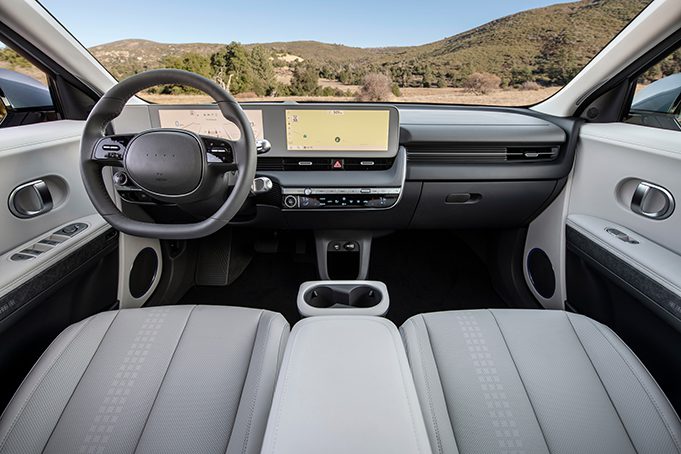
The seats are supportive and get the job done, but the driver’s seat has a fantastic feature where it can transform into a recliner complete with leg rest. It’s very comfortable and will make stopping to charge on a road trip almost relaxing. But you won’t have much time to relax—more on that in a bit.
The steering wheel is fine, though it looks a bit odd. It’s a two-spoke design, slightly flattened at the bottom without any logo in the center of the wheel. There’s a circular drive-mode controller on the bottom left of the wheel that I had a bit of trouble locating even though it was staring me in the face. Changing between the Eco and Normal and Sport modes resulted in a significantly different driving experience.
If you have the AWD dual-motor Ioniq 5, the car will disable one of the motors in Eco mode to improve range at the cost of some performance. All versions of the Ioniq 5 have a 77.4 kilowatt-hour battery pack. You can choose between a zippy AWD dual-motor setup making a total of 320 horsepower and 446 pounds-feet of torque or a slower (but not slow) single-motor RWD unit making 225 horsepower and 258 pounds-feet of torque.
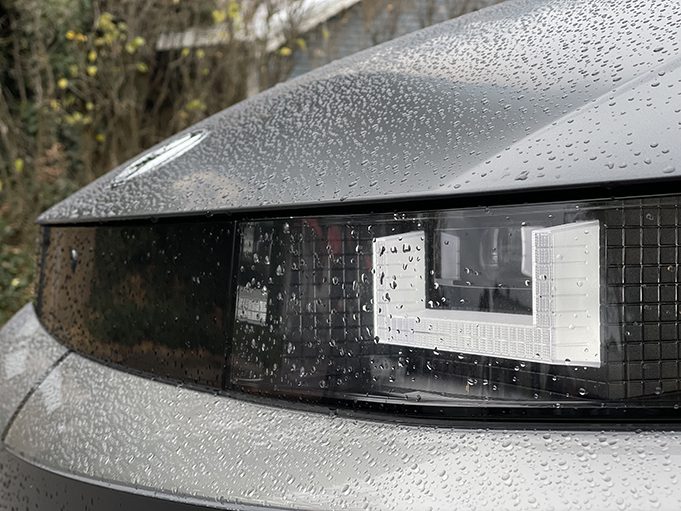
The AWD unit might sound like the obvious choice, but not so fast. The rear-wheel-drive setup gets an EPA-estimated range of 303 miles, while the dual-motor AWD version only rates to 256 miles. Both versions get a top speed of 115 mph and 2,000 pounds of towing capabilities, though no word on what hauling a ton of extra weight does to the range.
But the most exciting part of the Ioniq 5 is its incredibly quick charging. Using a 350-kilowatt fast charger, the car can slurp up 68 miles worth of range in five minutes or charge from 10 to 80 percent in 18 minutes.
It’s not just marketing hype, either. I saw it happen, and Hyundai released a video of it in timelapse and real-time formats. If you want to watch an Ioniq 5 charge for 18 minutes, you can do it.
The speed is thanks to the 800-volt battery system, a more-advanced setup than the Mustang Mach-E or Volkswagen ID.4. It’s the same type that Porsche uses in the Taycan, and it’s one of the big reasons I’m so excited about Hyundai and Kia’s new crop of electric cars.
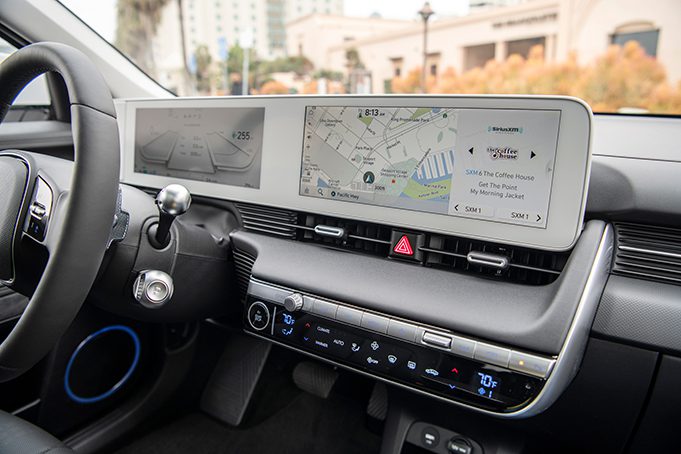
The Ioniq 5 is fun to drive, like so many EVs are, and the packaging and design are exquisite. But the fast charging experience will be life-changing for EV owners. We tested some Electrify America charging stations, and the Ioniq 5 was quickly charging well over the maximum charging speed of the EVs from Ford and Volkswagen.
The onboard navigation system includes real-time calculations to show how far you can go on a charge, and it can find charging stations on your route. To encourage fast charging, Hyundai has partnered with Electrify America to include unlimited 30-minute charging sessions for two years with each Ioniq 5.
Ioniq 5 includes the latest version of Hyundai’s excellent SmartSense drive assistance system, with an even better automatic lane-centering system. The adaptive cruise control is even more adaptive, using machine learning to mimic the driver’s tendencies for acceleration and spacing with the vehicle in front of you. If you’re a tailgating maniac, the car will learn from you, I guess.
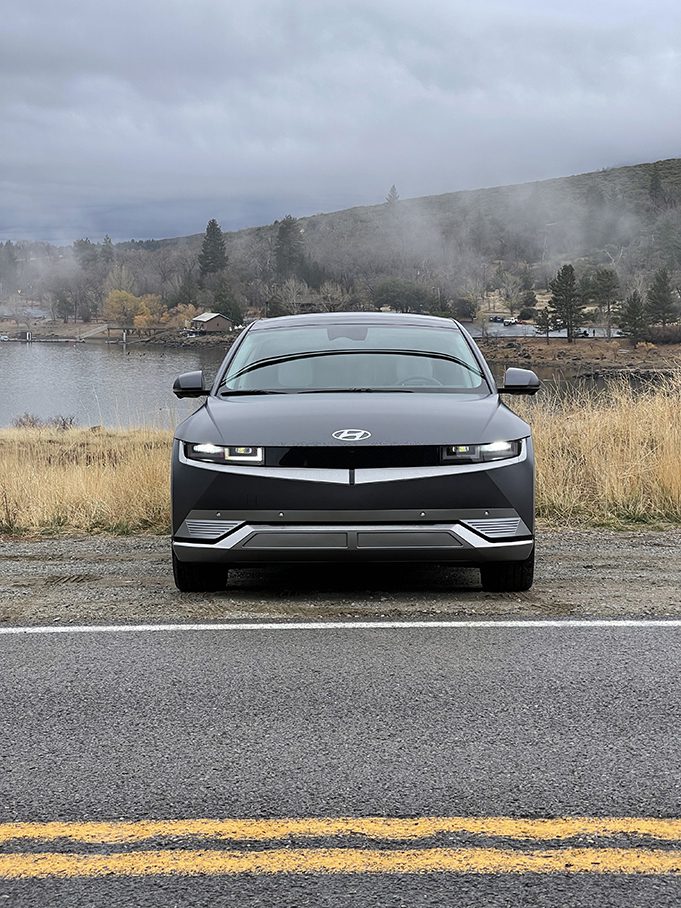
Also worth mentioning is the heads-up display, which includes an augmented reality system for navigation. Arrows will float in your line of view and get larger as you approach your turn. It’s hard to explain, but terrific in use. It’s a much better version of the floating augmented reality arrows in the Cadillac Escalade (review), but it’s actually beneficial since it’s in your direct line of view.
The Ioniq 5 starts at $44,875 before any tax credits for the single-motor, while the dual-motor begins at $48,375. They’re already showing up at Hyundai dealers, so if you hurry, you might even be able to snag one before everyone realizes how amazing it is.



